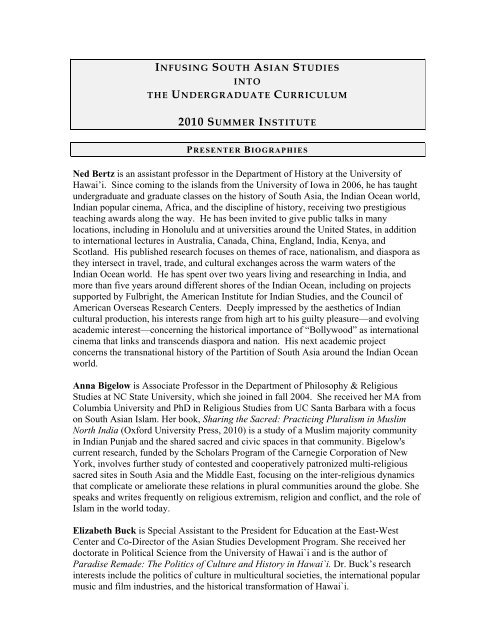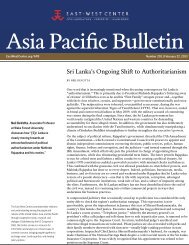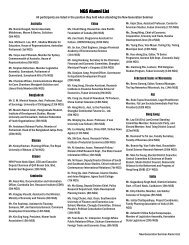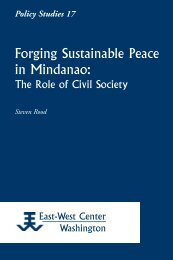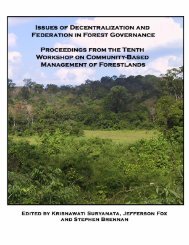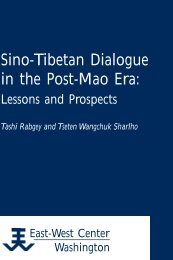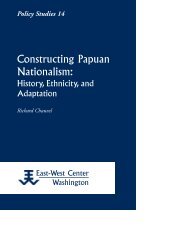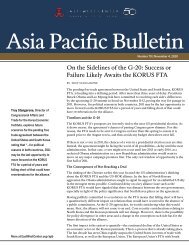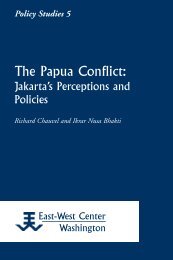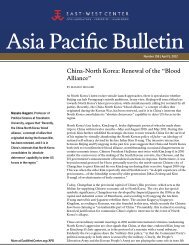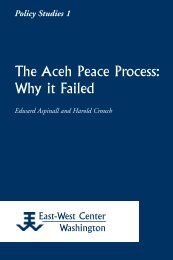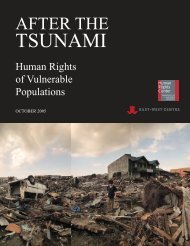Presenter bios - East-West Center
Presenter bios - East-West Center
Presenter bios - East-West Center
Create successful ePaper yourself
Turn your PDF publications into a flip-book with our unique Google optimized e-Paper software.
Arindam Chakrabarti received his doctorate from Oxford University, England in 1982.From 1983 to 1988 he was a Lecturer in Philosophy at the University of Calcutta, India.Between 1988 and 1992 he held the Spalding Visiting Fellowship at Wolfson College,Oxford, a Fellowship at the Institute of Advanced Study at Edinburgh, JacobsenFellowship and tutorship at University College London and a Visiting AssistantProfessorship at the University of Washington, Seattle. After being trained as an analyticphilosopher of language at Oxford, Professor Chakrabarti has spent several yearsreceiving traditional training in Indian logic (Navya Nyaya) and metaphysics which madehim fluent in Sanskrit. Before coming to Hawaii in 1997, he was a Professor in theDepartment of Philosophy at the University of Delhi, India. Professor Chakrabarti hasedited or authored four books and has published numerous articles and reviews. He iscurrently working on a book on moral psychology.S. Charusheela (Charu) is Editor of Rethinking Marxism, and Associate Professor ofWomen’s Studies at the University of Nevada, Las Vegas. An economist by training,Charu’s work focuses on gender issues in relation to the global economy, especiallyissues of gender and poverty in the Third World. She is the author of Structuralism andIndividualism in Economic Analysis (Routledge 2005) and Postcolonialism MeetsEconomics (co-edited with Eiman Zein-Elabdin, Routledge 2004). Recent publicationsinclude “The Diaspora at Home” (Cultural Dynamics), “Gender and the Stability ofConsumption: A Feminist Contribution to Post Keynesian Economics,” and “SocialAnalysis and the Capabilities Approach: A Limit to Martha Nussbaum’s UniversalistEthics” (both in Cambridge Journal of Economics). Charu is an active member of theInternational Association for Feminist Economics (IAFFE). She is serving her secondterm as an elected member of IAFFE’s board, and is a member of the editorial board ofthe organization’s journal, Feminist Economics. She has just been elected to serve athree-year term on the Executive Committee of the Cultural Studies Association (US).Charu is also an active member of the South Asian Feminist Collective, and has acted asconvener/co-convener of the group’s preconference for the past five yearsG. Shabbir Cheema directs the Asia-Pacific Governance and Democracy Initiative(AGDI). Before joining <strong>East</strong>-<strong>West</strong> <strong>Center</strong>, Dr. Cheema was Principal Adviser andProgram Director, Department of Economic and Social Affairs, United Nations (2001-2007), the Director of Governance Division of United Nations Development Programme(1995-2001) and Manager, Urban Development Unit (1990-95). Since 2005, Cheema hasbeen a Visiting Fellow at the Harvard University's Ash Institute for DemocraticGovernance and Innovation. He was the convener of the Ash Institute's Study Group ofEminent Scholars on Decentralizing Governance. From 1980 to 1988, Cheema was aDevelopment Administration Planner at the United Nations <strong>Center</strong> for RegionalDevelopment, Nagoya, Japan. He has taught at Universiti Sains Malaysia (1975-79),University of Hawaii (1988-89) and New York University (2002-2007). Cheema is theauthor of Building Democratic Institutions: Governance Reform in Developing Countries(Kumarian Press, 2005) and Urban Shelter and Services: Public Policies andManagement Approaches ( Praeger, 1987) and the co-editor of DecentralizingGovernance: Emerging Concepts and Practices (Brookings Institution Press incooperation with Harvard University,2007), and Reinventing Government for the TwentyFirst Century: State Capacity in a Globalizing Society (Kumarian Press, 2003).
Vrinda Dalmiya is Associate Professor of Philosophy in the Department of Philosophy,University of Hawaii at Manoa. She has also taught at the University of Washington,Seattle, Montana State University and Indian Institute of Technology, New Delhi. Herresearch interests include theory of knowledge, feminist epistemology, care ethics andenvironmental philosophy.Peter Hershock is Coordinator of the Asian Studies Development Program at the <strong>East</strong>-<strong>West</strong> <strong>Center</strong> in Honolulu, Hawai’i. He has earned degrees from Yale University (B.A.,Philosophy) and the University of Hawai’i (Ph.D., Asian and Comparative Philosophy)and has focused his research on the philosophical dimensions of Chan Buddhism and onusing the resources of Buddhist thought and practice to address contemporary issues,including: technology and development, education, human rights, and the role of valuesin cultural and social change. His books include: Liberating Intimacy: Enlightenment andSocial Virtuosity in Ch’an Buddhism (1996); Reinventing the Wheel: A BuddhistResponse to the Information Age (1999); an edited volume, Technology and CulturalValues on the Edge of the Third Millennium (2004); Chan Buddhism (2005); andBuddhism in the Public Sphere: Reorienting Global Interdependence (2006).Uzma Aslam Khan is a novelist and essayist. She was born in Lahore and grew up inKarachi, Pakistan. She is the author of three novels, The Story of Noble Rot (PenguinIndia 2001; reprinted in 2009 by Rupa & Co. India); Trespassing(Metropolitan/HenryHolt 2004), which was shortlisted for the Commonwealth Prize 2003 (Eurasia Region)and translated into thirteen languages; and The Geometry of God (ClockrootBooks/Interlink 2009), recently released in the UK, Italy, Spain, and France. TheGeometry of God was voted one of Kirkus Reviews’ Best Books of 2009, was a 2009finalist in Foreword Magazine's Book of the Year Awards, and received a bronze medalin the Independent Publishers Book Award 2010.Khan’s fiction has appeared in various anthologies, including And the World Changed:Contemporary Stories by Pakistani Women. Ed. Muneeza Shamsie (The Feminist Press2008); The New Anthem. Ed. Ahmede Hussain (Tranquebar Press 2009). Her short story,“Ice, Mating,” will appear in Granta Magazine’s forthcoming September 2010 issue#112. In addition to fiction, Khan has contributed articles to various newspapers andjournals around the world such as toDrawbridge UK, Counterpunch USA, and DawnPakistan. She has taught extensively, including at the Beaconhouse National Universityin Lahore. She joined the English Department at the University of Hawai’i in Fall 2008.Visit the author at http://uzmaaslamkhan.blogspot.comSankaran Krishna did his Bachelor’s at Loyola College in Chennai (majoring inChemistry), and Master’s from the <strong>Center</strong> for Historical Studies at Jawaharlal NehruUniversity in Delhi. He took his doctorate in political science from the Maxwell Schoolat Syracuse University in upstate New York. Since 1990, he has taught political scienceat UH-Manoa. His work so far has centered on nationalism, ethnic identity and conflict,identity politics, and postcolonial studies, located primarily around India and Sri Lanka.His two published books are Globalization and Postcolonialism: Hegemony andResistance in the 21st Century, Lanham, MD: Rowman and Littlefield, 2009 andPostcolonial Insecurities: India, Sri Lanka and the Question of Nationhood, Minneapolis:University of Minnesota Press, 1999. (New Delhi: Oxford University Press, 2000). Hehas published numerous other articles in journals and edited books.
Paul Lavy is assistant professor of South and Southeast Asian art history at theUniversity of Hawaii at Manoa. He received his B.A. in cultural anthropology fromMary Washington College, Fredericksburg, VA, and his M.A. and Ph.D. in South andSoutheast Asian art history from the University of California, Los Angeles. Hesubsequently taught ancient art history at Loyola Marymount University, Los Angeles,and Asian and Islamic art history at Pennsylvania State University, University Park. Dr.Lavy has conducted research in India and throughout Southeast Asia, including Vietnam,where he lived and worked as an independent lecturer and researcher prior to coming toHawaii. His ongoing research, which has been funded by the Metropolitan Museum ofArt, the Asian Cultural Council, and the National Security Education Program,investigates the links between art/architecture and politics in early historic SoutheastAsia. His primary interests are the Hindu-Buddhist artistic traditions associated withMekong Delta and Preangkorian Khmer civilizations and their relationships with the artof South Asia (ca. 5th – 9th cent. CE).Ananya Vajpeyi teaches South Asian History, Asian History and World History at theUniversity of Massachusetts in Boston. She was educated at the Jawaharlal NehruUniversity, at Oxford University, where she read as a Rhodes Scholar, and at theUniversity of Chicago. She has been a fellow at the Nehru Memorial Museum andLibrary, as well as Opinions Editor at The Indian Express newspaper, and has taught for ayear at the School of International and Public Affairs, Columbia University (2006-07). Inaddition, she has had teaching stints at the Centre for Law and Governance, JNU and theNational Law School of India, Bangalore. Vajpeyi has has published widely in academicjournals and has contributed chapters to Studies in History (2004), Saberwal and VarmaEd.; Traditions in Motion (OUP 2005), Islamoglu and Carroll Ed.; Shared Histories ofModernity (OUP 2009), Lubin, Davis et al Ed.; and The Cambridge Handbook of Lawand Hinduism (CUP 2010), and Bronner, McCrea et al Ed.. Her book, RighteousRepublic: The Political Foundations for Modern India, will be published next year byHarvard University Press. Vajpeyi also writes regularly for newspapers and magazines inIndia and abroad, with articles appearing in The National, New Statesman, The Times ofIndia, The Calcutta Telegraph, Wasafiri, The Economic Times, Outlook Online, Killingthe Buddha and The Indian Express.


